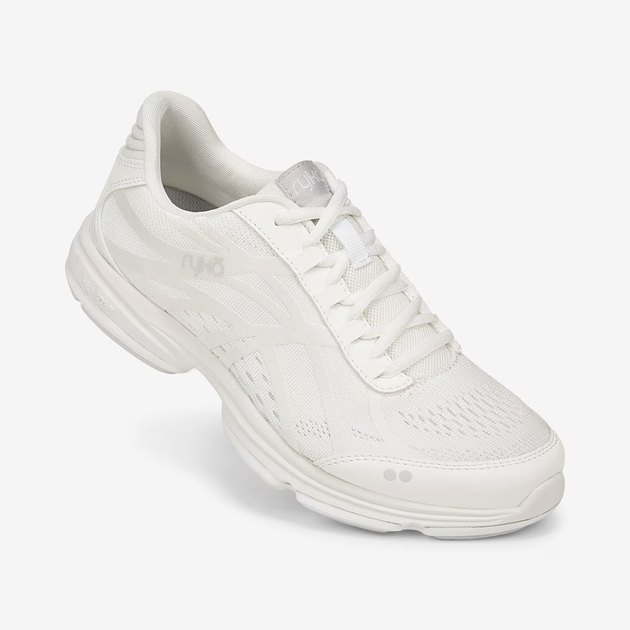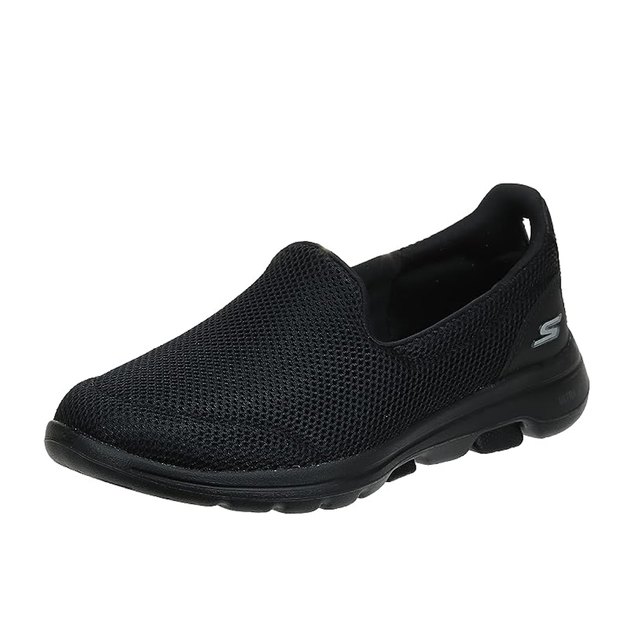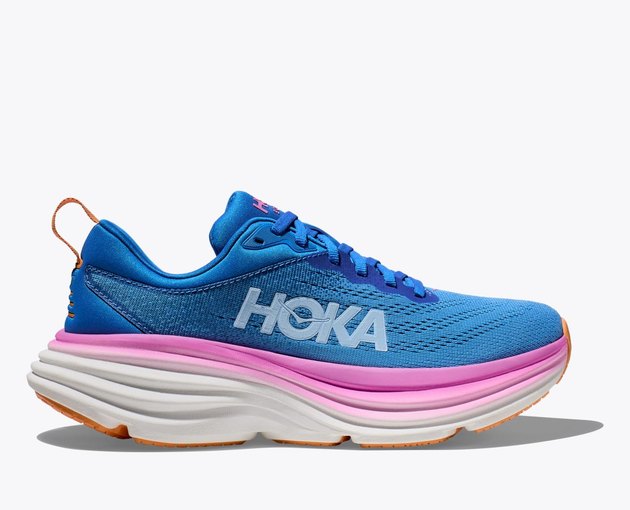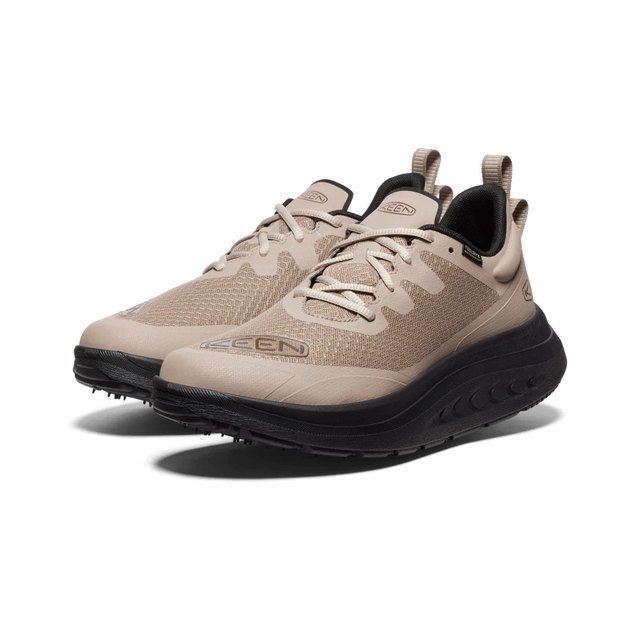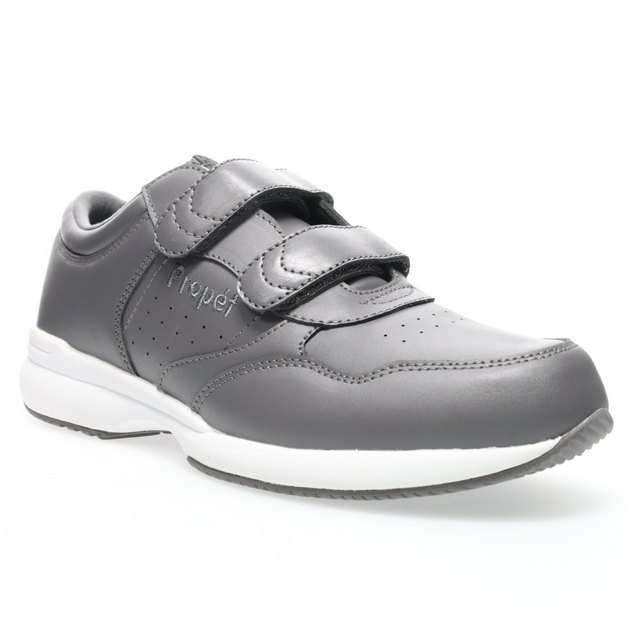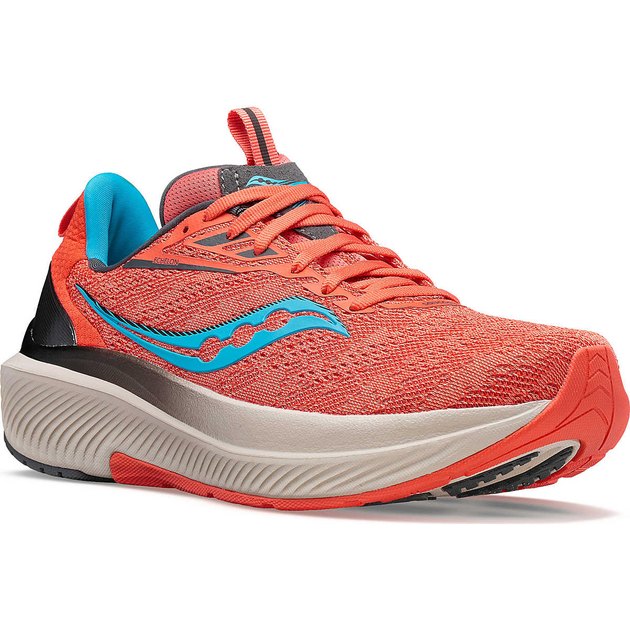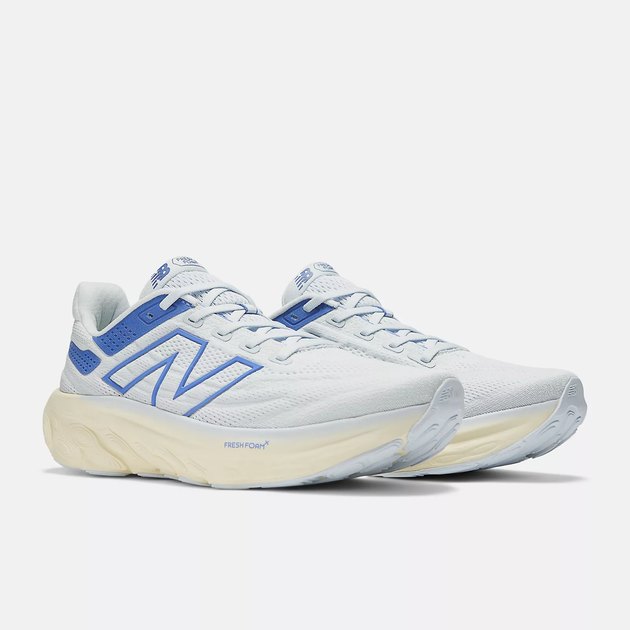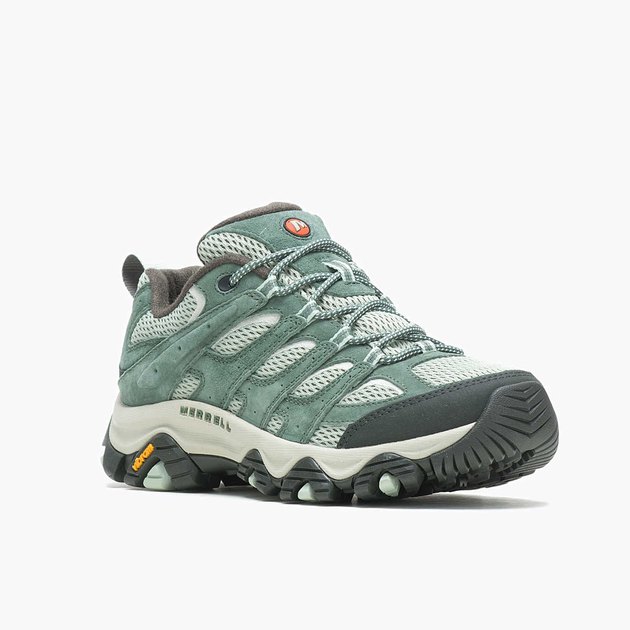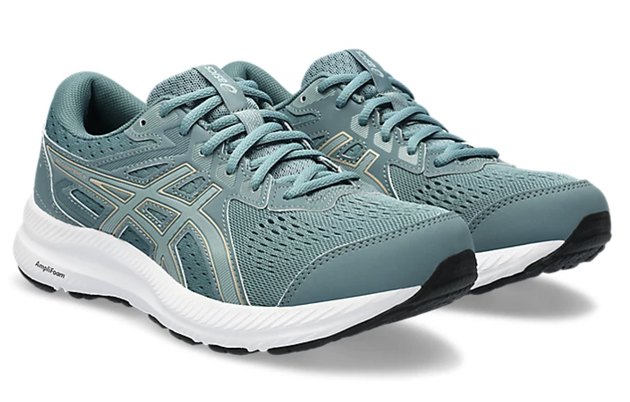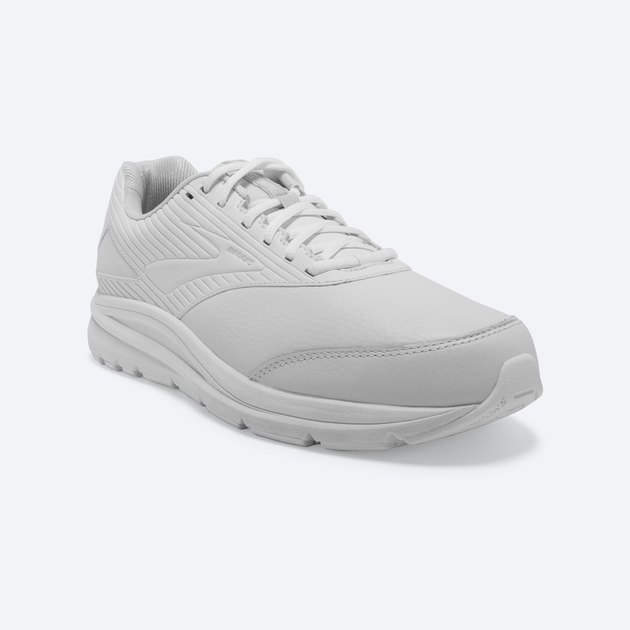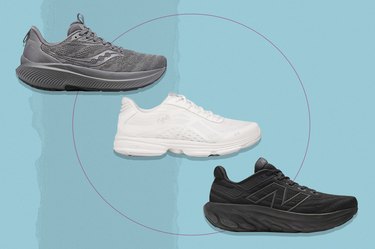
Whether you're going for a quick stroll through your neighborhood park or on an intense hike along some nature trails, wearing comfortable and well-fitting shoes is crucial, particularly for older adults.
As we age, the need for footwear with added support, stability and durability becomes essential, Mohammad Usman DPM, a podiatric surgery specialist in Chicago, Illinois, tells LIVESTRONG.com. This is primarily because older individuals are more prone to experience elevated discomfort, pain and a range of foot-related issues, according to UCLA Health, including blisters, bunions, tightness, cramps, heel pain and arthritis.
Video of the Day
Video of the Day
Dr. Usman adds that finding the right pair of walking shoes that fit properly is also critical for older adults to prevent injuries, such as ankle fractures, plantar fasciitis, shin splints and potentially even falls.
"Wearing the proper shoes for walking is crucial. Footwear provides necessary support to the arch, ensuring alignment of the feet, ankles, knees and hips," he says. "This alignment isn't merely about comfort during walking — it plays a vital role in injury prevention."
If you're in search of top-notch walking shoes tailored to the specific needs of older adults, look no further. Here are the best walking shoes for seniors that podiatrists recommend.
Our Picks
- Best Overall for Women: Ryka Devotion Plus 3 ($99.99, Ryka)
- Best Overall for Men: Vionic Classic Walker Sneaker ($109.95, Vionic)
- Best Value: Skechers Performance Go Walk 5 ($40, Amazon)
- Best Cushioned: Hoka Bondi 8 ($165, Hoka, men’s and women’s)
- Best Waterproof: Keen WK400 Waterproof Walking Shoe ($175, Keen Footwear, men’s and women’s)
- Best for Diabetes: Propét LifeWalker Strap ($94.95, Propét Footwear, men’s and women’s)
- Best for Stability: Saucony Echelon 9 ($150, Saucony, men’s and women’s)
- Best for Balance: New Balance 1080v13 ($164.99, New Balance, men’s and women’s)
- Best for Durability: Merrell Moab ($120, Merrell, men’s and women’s)
- Best for Plantar Fasciitis: Asics Gel-Contend 8 ($54.95, Asics, men’s and women’s)
- Best for Flat Feet: Brooks Addiction Walker 2 ($130, Brooks, men’s and women’s)
How We Chose
We talked to podiatrists and foot surgeons to determine features that make a good walking shoe for older adults. With their recommendations in mind, we picked the best 11 pairs based on the following criteria.
- Support and stability
- Comfort
- Durability
- Breathability
- Variety of sizes and colors
- Cost
Learn more about how we cover products here.
Are There Any Real Differences Between Men’s and Women’s Footwear?
Shoes are marketed to men and women primarily due to differences in foot anatomy, size and style preferences between the two genders, Nam Tran, DPM, a podiatrist and foot surgeon at Dallas Direct Podiatry, tells LIVESTRONG.com.
However, the biggest difference between men’s and women’s shoes is the size, because men’s shoes tend to be wider than women’s, Dr. Tran says. Other variations between footwear include arch support and design, such as colors and styles.
“Other than that, the features of the shoes should be the same and are based on the shoe model,” Dr. Tran says.
1. Ryka Devotion Plus 3
According to Dr. Usman, the Ryka Devotion Plus 3 shoes are specifically designed for women, taking into account the anatomical differences between men's and women's feet. The shoes are wider on the forefoot and narrower on the heel, making them a tailored fit for women.
Another standout feature is that they are made with responsive cushioning technology for shock absorption and impact protection, which can reduce discomfort and pain associated with foot conditions like arch pain, heel pain or plantar fasciitis.
The Devotion Plus 3's are also made with breathable mesh and overlays so you won't have to worry about sweaty or soggy feet during long walks. The outsoles feature an eight-piece rubber sole that provides increased traction and durability for any type of walking surface.
The shoes are offered in sizes 5 to 12 with stylish designs and colors, including black, white, purple, navy and grey. Dr. Usman says they mostly fit true to size, generally with a medium width. However, these shoes do have a narrower fit compared to other options and are less suitable for men due to the design.
2. Vionic Walker Classic Sneaker
The Vionic Walker Classic sneakers are one of the top men's footwear for walking due to podiatrist-designed features — including comfortable cushioning throughout the footbed and midsole that's made with "active motion system (AMS)" technology.
The firm thermoplastic in the heel provides increased stability and support with every step. Plus, the outsoles are made with durable rubber, providing reliable traction and reducing the risk of falls and slips.
They also come with removable insoles, accommodating custom orthotics if needed. This feature is particularly important for older adults who have specific foot conditions or orthotic requirements.
They're available in medium and wide widths in men's sizes 7 to 14 and are offered in classic colors, including grey, black, white and black and white. These shoes have also received American Podiatric Medical Association (APMA) approval. It's important to note that some users report that the shoe can feel stiff at first and may take time to break in.
3. Best Value: Skechers Go Walk 5
The Skechers Go Walk 5's are the ideal option for older adults who are looking for an affordable yet easy-to-put on shoe that's also lightweight, flexible and supportive, Dr. Usman says.
They're lightweight (weighing 5.55 oz per shoe for a women's size 7) but still provide adequate and high-rebound cushioning, a feature that can help reduce strain on joints and muscles. A durable dual-density outsole adds traction, stability and grip.
The Go Walk 5's are made with "Skechers Air Cooled Goga Mat" and soft woven athletic knit mesh fabric on the uppers making it breathable and comfortable to wear. They're also less than $50 for the women's and less than $60 for the men's, which is an affordable option compared to many other shoes on the market.
They are available in women's sizes 5 to 13 and men's 7 to 16, with wide-width options, and come in basic colors like black, taupe and navy.
4. Hoka Bondi 8
The Hoka Bondi 8's are the optimal pick for older adults who are looking for extra cushion in their everyday walking shoe: They provide ultra-cushion, support and stability, Dr. Tran says.
They're made with lightweight foam and thick, full-length mid-soles to absorb shock and impact, which provide the necessary protection for sore joints with every step you take, from short walks to long walks on the treadmill and everything in between.
The Bondi 8 also features ample cushion and synthetic and mesh uppers, adding to the shoe's overall comfort, fit and breathability. You can also snag them in vibrant and bold colors like pink clay, diva blue and mock orange, in addition to neutral colors such as white, black and grey.
Hoka makes these in men's sizes 7 to 16 and women's sizes 5 to 12, including half sizes. These shoes have also earned the American Podiatric Medical Association (APMA) Seal of Acceptance, signifying their positive and beneficial impact on foot health.
5. Keen WK400 Waterproof Walking Shoe
The Keen WK400 walking shoe features balancing technology to give those who wear them the feeling of forward momentum. The shoes are waterproof yet breathable to ensure your feet stay dry in wet and slippery conditions (winter walks, anyone?), making them an ideal choice for older adults who need reliable protection without compromising on comfort.
The shoes also feature rubber outsoles, multi-directional lugs and a full-length nylon plate for better traction, grip and added stability when walking on various terrain, from asphalt to the single-track. The WK400 waterproof versions are only available in two colors, including black and sand in women's sizes 5 to 12 and men's sizes 7 to 15.
No need for waterproofing? Keen does offer the shoe in a non-waterproof version for both men and women at $160.
6. Propét LifeWalker Strap
The Propét LifeWalker Strap is a classic walking shoe that's perfect for anyone looking for an easy-to-slip-on, lace-free option. The shoe features a hook-and-loop double strap closure system that allows for easy adjustments, also making it a suitable choice for older adults who may have difficulty with laces or who require a customizable fit due to neuropathy from diabetes.
This style has also been approved for reimbursement under the Medicare Therapeutic Shoes for Persons with Diabetes Benefit, so if you have diabetes, the cost may be covered under Medicare (be sure to talk with your doctor first).
The midsoles are well-cushioned with EVA and feature a padded collar and tongue, offering excellent comfort and support for daily walking and decent arch support for those with flat feet, Dr. Usman says. They also have removable insoles, so you can add custom orthotics if needed.
Dr. Usman does note that these shoes may be less stylish to some due to their orthopedic design and can feel heavier for some. But they're available in various widths, including medium, wide and extra wide in neutral colors, such as black and white. They come in women's sizes 5 to 12 and men's sizes 7 to 18.
7. Saucony Echelon 9
The Saucony Echelon 9 shoes stand out as the ultimate shoe choice for stability for older adults due to their design and blend of support, comfort and durability. The shoe is made with thick, soft but lightweight PWRRUN foam cushioning, allowing those who wear it to get the support they need without the extra bulk or weight, Dr. Usman says.
The midsole is also well-cushioned with responsive foam for excellent shock absorption, reducing the impact on aging joints and muscles. The Echelon 9's also provide ample room from heel to toe due to its wide toe box feature, helping minimize any discomfort and constriction that can occur from cramped toe spaces. (However, this feature may not be the best for those who have very narrow feet.) The shoes also have reliable arch support, helping reduce any discomfort linked with flat or fallen arches.
They're made in women's sizes 5 to 12 and men's sizes 7 to 15 in three different widths, including regular, wide and extra wide. The shoes come in several color options and are also APMA-approved.
8. New Balance 1080v13
Although these shoes are marketed for running, they're great for everyday use, including easy to moderate walking. They are highly cushioned and bouncy so when it comes to walking on packed dirt or hard pavement, your feet will rarely feel strained or in pain.
The generous amount of cushioning and shock-absorbing material reduces impact on the feet and lower extremities — and minimizes discomfort and the risk of falls from balance issues.
The shoes also feature a knitted mesh and structured upper, offering a snug and supportive fit with flexibility. These features are key for older adults as they ensure stability, balance and comfort (without blisters). The 1080v13 is also known for its arch support — critical for balance, as it helps maintain proper foot alignment and reduces the risk of ankle rolls.
It's important to note the 1080v13s tend to run wide, but they do come in a narrow width. New Balance makes these in women's sizes 5 to 13 and men's sizes 7 to 16 and six different standard colors.
9. Merrell Moab 3
The Moab 3 is an all-purpose walking and hiking shoe that's meant to be worn outdoors and uneven terrain. They are best for older adults who frequently walk on more intense or challenging routes/trails.
The upper is leather with a cushioned mid-sole for added durability, toughness, comfortability and shock absorption. Plus, the shoes feature a protective rubber heel and toe cap to prevent pain and injuries like blisters or bruising from kicking rocks or roots.
According to Dr. Tran, the Moab 3 strikes the perfect balance between shallow enough to be comfortable and deep enough to keep up with the trails. They are available in neutral tones like granite, walnut, olive, brown and black in women's sizes 5 to 12 and men's sizes 7 to 16.
While they are known for their durability and affordability, Dr. Tran says they can feel heavier compared to most shoes on the market and aren't as sleek-looking.
10. Asics Gel-Contend 8
The Asics Gel-Contend 8 are one of the best shoes for plantar fasciitis or if you're prone to heel pain. That's because they are well-padded and have gel cushioning in the forefront and rearfoot, Dr. Usman says.
They offer exceptional shock absorption and support with every step, alleviating discomfort and minimizing impact on the feet, providing relief from conditions like heel pain.
The shoes are also made with mesh fabric on the uppers, improving airflow and circulation to your feet, with synthetic stitching on the overlays, which creates a more durable and supportive hold for your foot. The shoes are available in sizes 5 to 12 in 19 different colors for women and sizes 6 to 15 in 15 colors for men.
Dr. Usman says it's important to note these shoes may run more narrow in the toe box area and might wear out faster with intense use over time. They're also designed for neutral foot types, they may not be ideal for older adults who have flat or high foot arches.
11. Brooks Addiction Walker 2
Dr. Usman says that these are known for providing great support and stability, particularly for those with flat feet, overpronators or individuals who walk or stand for hours at a time.
The shoes feature an extended progressive diagonal rollbar (PDRB), which helps correct the foot when it rolls too far inward toward the arch. The PDRB is also designed to reduce the impact on your joints and keep the body in its natural path of motion, promoting smooth transitions during exercise and walking.
The outsoles of the shoe are also made with certified slip-resistant material and the uppers are made with 100 percent leather, offering not only a durable shoe but a classic look. Dr. Usman says it's important to consider that the shoes may feel heavier and lack breathability compared to other options on the market. They may also run a bit narrow for some people, but come in wide and extra wide options.
They are available in only two colors (black and white), in women's sizes 5 to 12 and men's sizes 7 to 15.
What to Look For Before Buying a Walking Shoe
Good shoes are extremely important for walking, Dr. Tran says. After all, they serve as protection against the external environment, can increase performance when walking across difficult terrain and play a crucial role in decreasing injuries.
"Properly fitting shoes can be the difference between a walk that is comfortable and enjoyable and a walk that is painful and could lead to injury," Dr. Tran says.
So before you pick your next walking shoe, here are some important things to consider and look for.
1. Comfort and Fit
The most important factor you should consider before buying a walking shoe is its comfort and fit, Dr. Usman says. The shoes should fit well while still having enough room for your toes, as well as a secure heel fit.
An accurate fit is key for ensuring stability and reducing injury risk, Dr. Usman adds. Shoes that are well-fitted and comfortable should not cause any discomfort, pain, tightness, rubbing or pressure points.
Some brands offer shoe models that come in different widths, including narrow, wide and extra wide to cater to different foot shapes, Dr. Tran adds. Be sure to try shoes on and walk in them to ensure that the fit is ideal and to your liking.
2. Arch Support
Another critical factor to consider before purchasing walking shoes is ensuring they offer the right arch support, Dr. Usman adds. Older adults in particular face challenges due to age-related changes in the feet, including looser ligaments, sometimes swollen feet or flat arches.
Good arch support can alleviate discomfort and promote proper alignment. To check if a shoe has good arch support, gently press the insole in the arch area with your fingers. If it resists the pressure from your fingers and offers some resistance, it can be a sign that the shoe has good arch support. If the insole collapses easily, it may not provide sufficient arch support.
You can also look at the insoles and midsole for visible arch support features or check the model's details.
3. Cushioning
When it comes to good walking footwear, older adults should look for shoes that have a good amount of cushion, Dr. Tran says. That's because as we age, we lose fat on the bottom of our feet, known as fat pad atrophy.
This loss of fat can lead to pain, so "wearing a shoe with more cushion can help mimic the fat that we have lost throughout the years." Plus, shoes that have adequate cushioning in the insole and midsole can absorb shock, reduce the impact on joints and provide comfort during walks.
4. Stability
A quality walking shoe for older adults should provide stability because as we age, we often encounter balance issues, Dr. Tran says. Shoes that are too flexible may also lack the necessary support, leading to an increased risk of tripping, falling and other injuries like ankle sprains, he adds. Select shoes with non-slip outsoles, a stable heel and proper arch support for stability and balance.
5. Lightweight and Breathable design
According to Dr. Usman, older adults should consider whether or not a shoe is lightweight and breathable. Lightweight shoes can be easier to walk in, particularly if you have reduced muscle strength. Shoes that are bulkier or heavier may also lead to fatigue more quickly.
Look for shoes with good ventilation and breathable materials, like mesh, to help prevent moisture and discomfort. These features are especially important for those who spend longer periods walking.
6. Easy to Put On
Older adults may want to look for shoes that are easy to put on, especially for those with mobility challenges, Dr. Usman says. Shoes with easy-to-use closure systems like Velcro straps or slip-on designs can be more practical.
"Choosing the right shoe is the first step to foot health," Dr. Usman says. "But for personalized care and to address unique foot conditions, seek the expertise of a podiatric surgeon and specialist."
- American Podiatric Medical Association: "Balance-Boosting Footwear Tips for Older People"
- American Podiatric Medical Association: "Seal of Acceptance Program"
- American Academy of Orthopaedic Surgeons: "Staying Active As You Age"
- American Association for Retired People: "How to Buy the Best Walking Shoes"
- SeniorLiving.org: "Shoes for Seniors"
- The Mayo Clinic: "How to determine your foot arch type"
- American Podiatric Medical Association: Products by Category- Footwear, Athletic
- Harvard Health Letter: Feet and Falling
